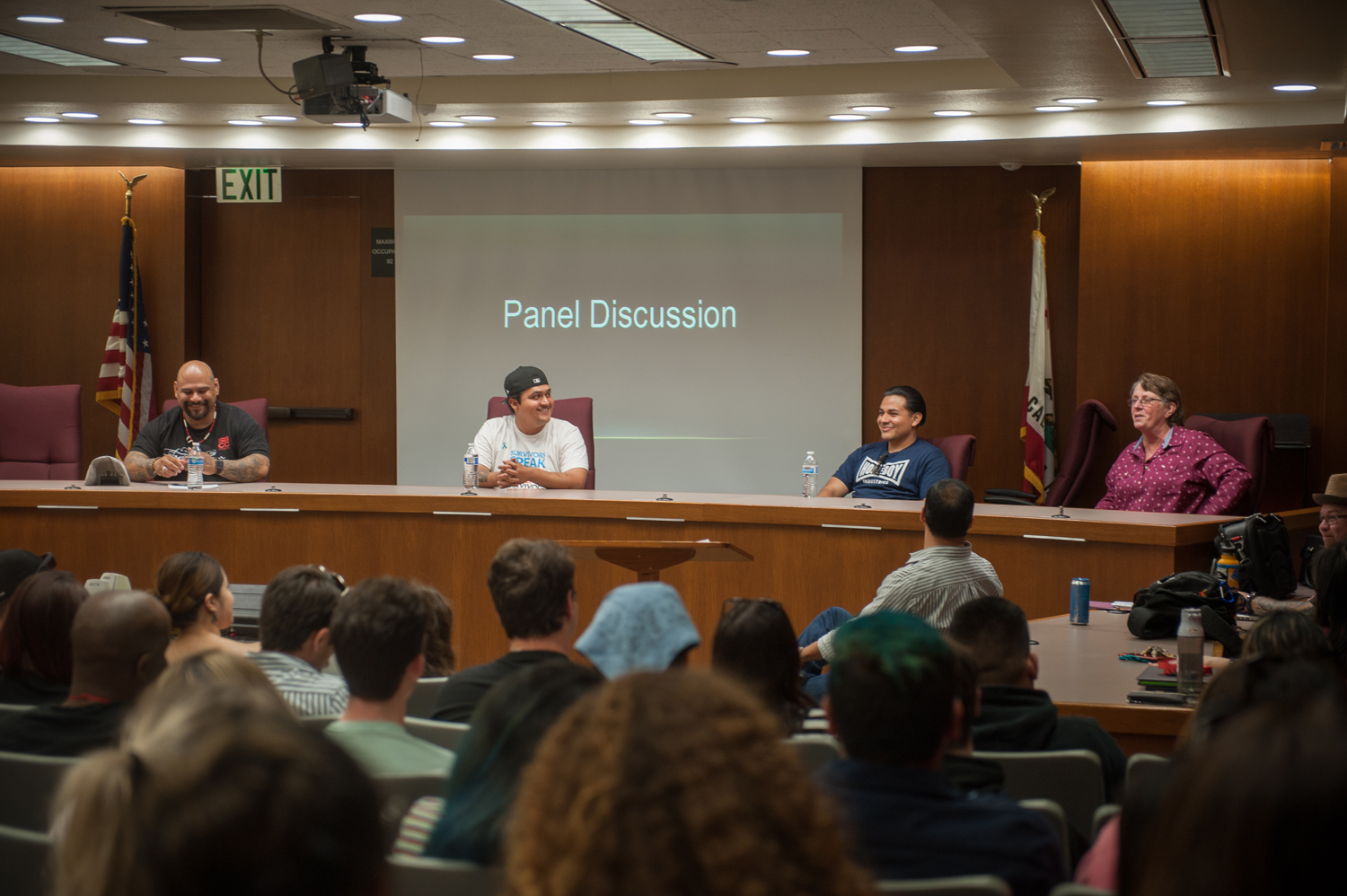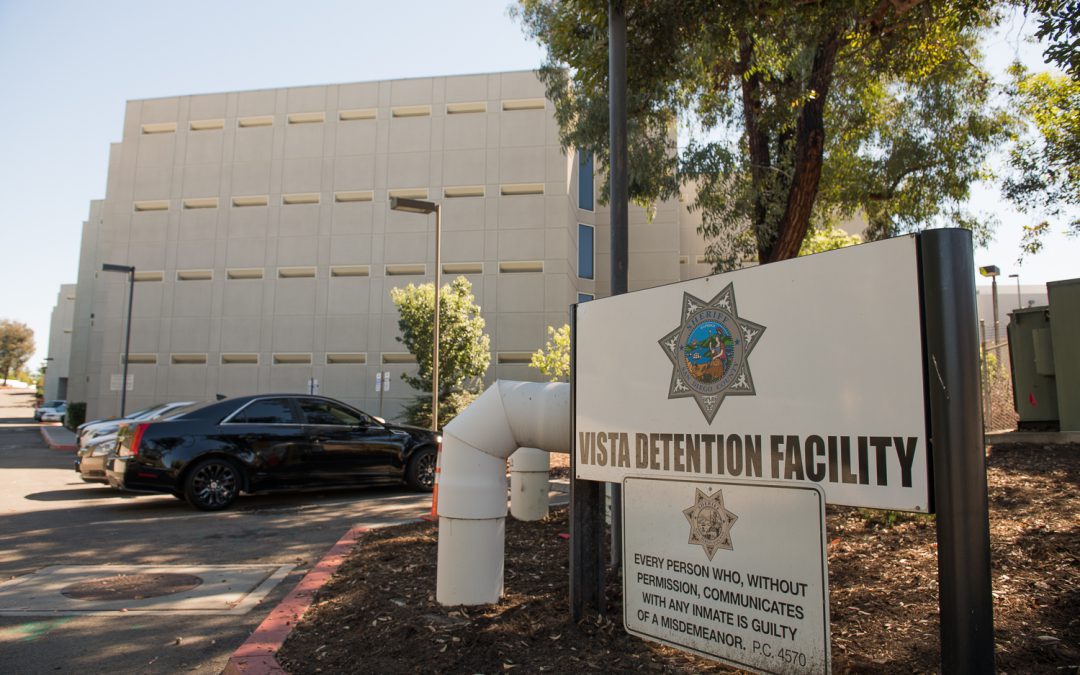Palomar College brings courses into the Vista Detention Facility as formerly incarcerated students on campus get their feet under them. In the effort to assimilate back into society, everyone seems to agree about one thing: “Education is the key.”
SAN MARCOS — It was an unforgettable class, to say the least.
Standing in the stark interior of a jailhouse, separated from the convicted felons by a red stripe on the concrete, Mary Ellen Brooks was ready to do the same thing she’d been doing for more than 40 years: teach a sociology class. Deliver the curriculum.
Except she wasn’t ready.
“I had been told I couldn’t bring any notes, I couldn’t bring any water to drink, and when I gave them the OK, the deputies would leave and lock the door behind them,” Brooks recalled. “When I heard the metal lock in the door, I thought, ‘What have I done?’”
Brooks’s class was the tip of the spear—a new partnership between Palomar College and the San Diego County Sheriff’s Department to provide classes to inmates while they are still behind bars. In the only partnership of its kind in North County, the Department pays for the textbooks and classroom materials, and Palomar provides instruction with support services.
“It makes sense that you can combat recidivism by reaching students and giving them a leg up while they’re incarcerated, so when they leave they have something to start with,” said Suzanne Sebring, Director of Occupational and Noncredit Programs at Palomar.
Previously, Sebring said, the Vista inmates didn’t have access to college courses for credit—there were only noncredit or “programming” activities like meditation or drug and alcohol counseling.
But now, thanks to Palomar College, students behind bars can earn college credit while they serve their time—credit that counts toward degrees and, one day, jobs in the community.
Inside the Veterans Module
That day in the Vista jail, Brooks had a telephone on the desk in case anything went wrong. There were cameras everywhere. And in front of her, across the red line, 14 convicted criminals.
She recalled nearly backing out in the weeks leading up to that first session inside the Vista Detention Facility. She was nervous and wasn’t sure it was a good idea.
“But had I acted on that impulse,” she said, “I would have missed out on one of the best things I’ve ever done.”
It helped that the inmates were part of the Veterans Module, where “you have to have been in the military, honorably discharged, and low-risk, which means you were incarcerated for a nonviolent offense,” Brooks explained.
And it turned out to be a surprisingly engaged class: “This group was very bright, very engaged, and very eager to learn. We had wonderful discussions,” she said. “You bring the street smarts into the classroom and then show how they can see the world through their own lens—they were as enthusiastic as I’ve ever seen students.”
When Brooks wrapped up her final class of the semester, she headed for the door and the students all came across the red line.
“I knew them so well by that point that I knew I was only at risk of getting hugged,” she said. “One of them said, ‘We want to thank you. If we’d had this kind of an education before, we wouldn’t be here now.’”
On Friday, Oct. 19, Brooks began her second class behind bars: Cultural Anthropology, a fast-track course that will wrap up before Christmas.
“Palomar is perfectly suited to provide the broad range of classes that are appropriate for these folks,” she said. “I left saying, ‘I want to come back.’ These folks have great potential, and I think we can do a lot to serve them.”
Campus Transitions
Life is notoriously difficult for the formerly incarcerated, but a new program to support and integrate students who have served time is helping ease the transition at Palomar.
Led by Martin Leyva, a formerly incarcerated Sociology professor from Santa Barbara, the campus effort includes a student club that meets once a week. Leyva has been instrumental in establishing a support network for formerly incarcerated students across North County, and he is now an adjunct faculty member at Palomar.
“I think this college is doing well with this population,” he said. “Palomar got it right.”

During Political Economy Days at Palomar College on April 11, 2018, Martin Leyva, Gregory Mendoza, Jose Juarez and Patty Petersen (left to right) participated in a panel discussion about life and education after incarceration. “I wish they had a Ph.D. for marginal education, because I learned on the margins, and I brought those margins into the classroom with me,” said Leyva, who now teaches Sociology at Palomar.
This summer, 22 students entered the inaugural Transitions program, which Sebring described as a learning community specifically for the formerly incarcerated. They showed up Monday through Thursday for two courses and participated in peer counseling and team-building activities on Fridays.
“Transitions helps us make sure they have a student support group here on campus as soon as they are released,” said Sebring. “There’s a lot of wrap-around support available to students in the program.”
Of the 22 who entered the summer program, 19 finished and transitioned to enroll in their first fall semester, and 15 are enrolled full-time.
Among them is Lawrence Morris, 60, a parolee who lives in Escondido and rides his bicycle 40 minutes each way to Palomar every day.
Morris said that, as a younger man starting a life sentence, he quickly realized how important it would be to pursue his education while behind bars. He recalled a telling moment while he was serving as a GED tutor years ago: “At Soledad, I knew a grandfather, father and son from the same family who were all in prison at the same time—under circumstances that could have been broken by education.
“Education is the only way to break the incarceration cycle,” said Morris, who hopes to transfer to Cal State San Marcos and ultimately earn his Ph.D. in Sociology. “Our society’s built a pipeline for marginalized people to go to prison and stay there.”
Ashley Flores, who is currently serving as the President of the Transitions student club at Palomar, echoed Morris: “I honestly think education’s the key,” said Flores. “I knew to succeed in life I needed to come to school and get an education. If you want to, you can change. And education is the key because it opens doors.”
For her part, Sebring said she was “very excited” with the results of both the Vista jail classes and the Transitions efforts on campus.
“Many people are putting a lot of time and effort into this, and the students themselves were just saying this changed their lives,” said Sebring. “Having these programs, with faculty and staff who are welcoming, is so important to these students. It gives them the extra support they need to feel like they can do this.”
Many formerly incarcerated students set high goals for themselves. Morris, for example, has his sights set on a doctorate.
“I want to be able to say, ‘Good afternoon, my name is Lawrence and my first name is Doctor.’ And I want to change the world a little bit at a time.”

